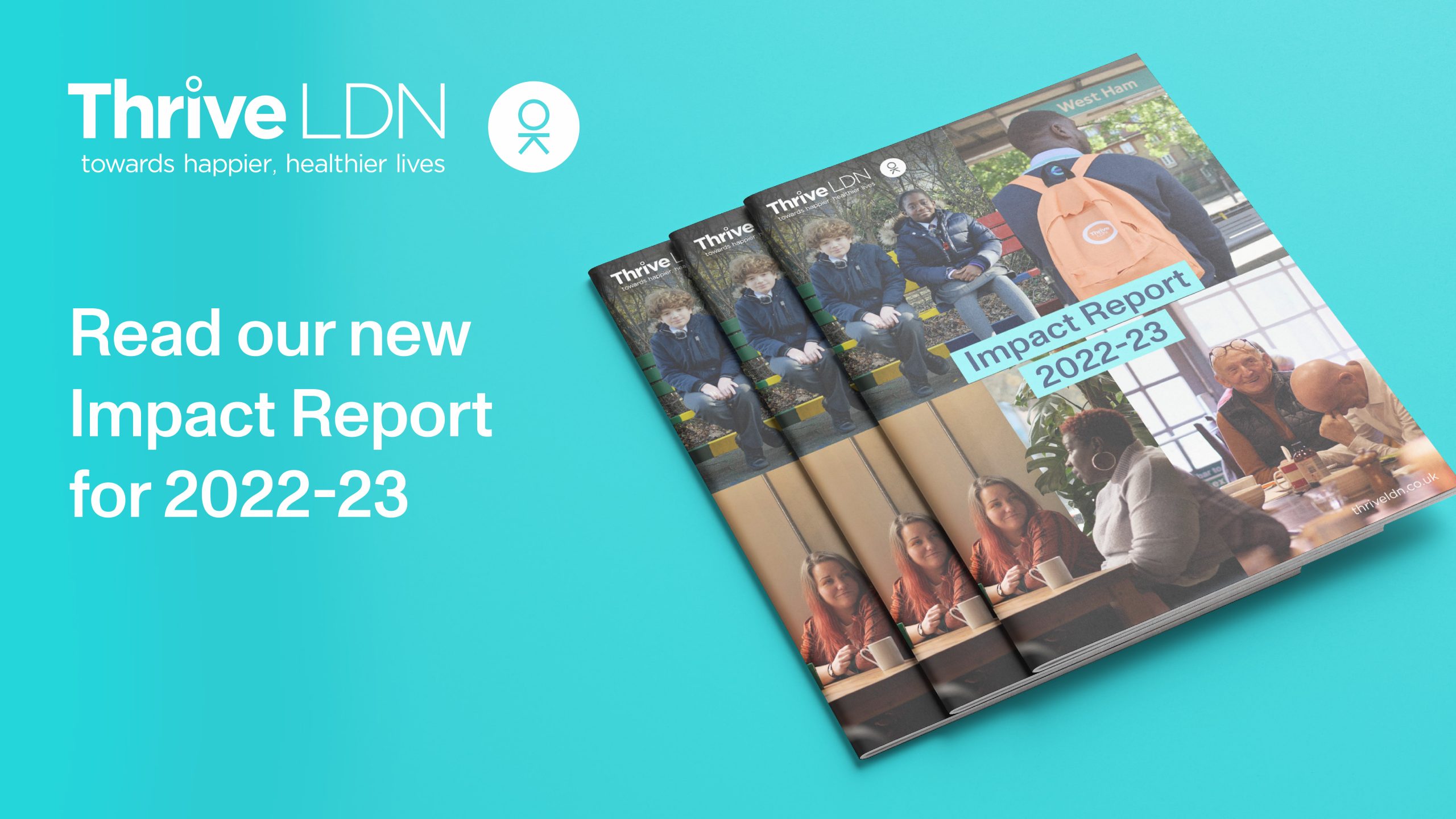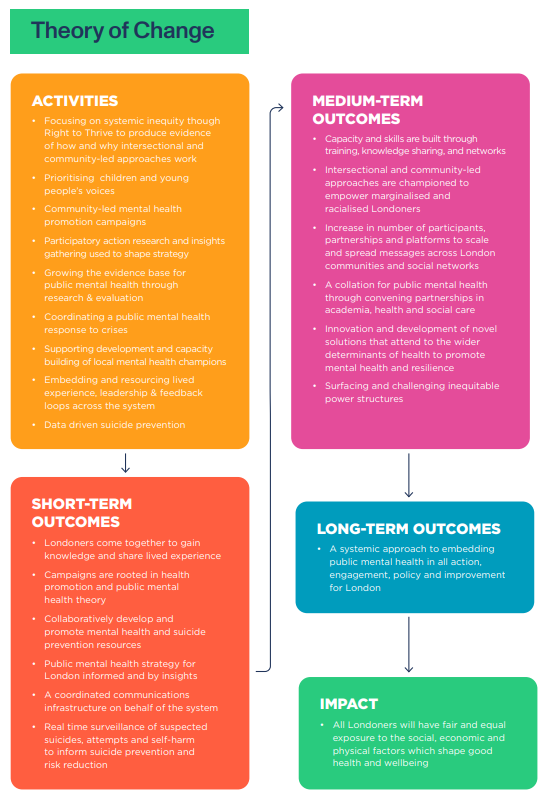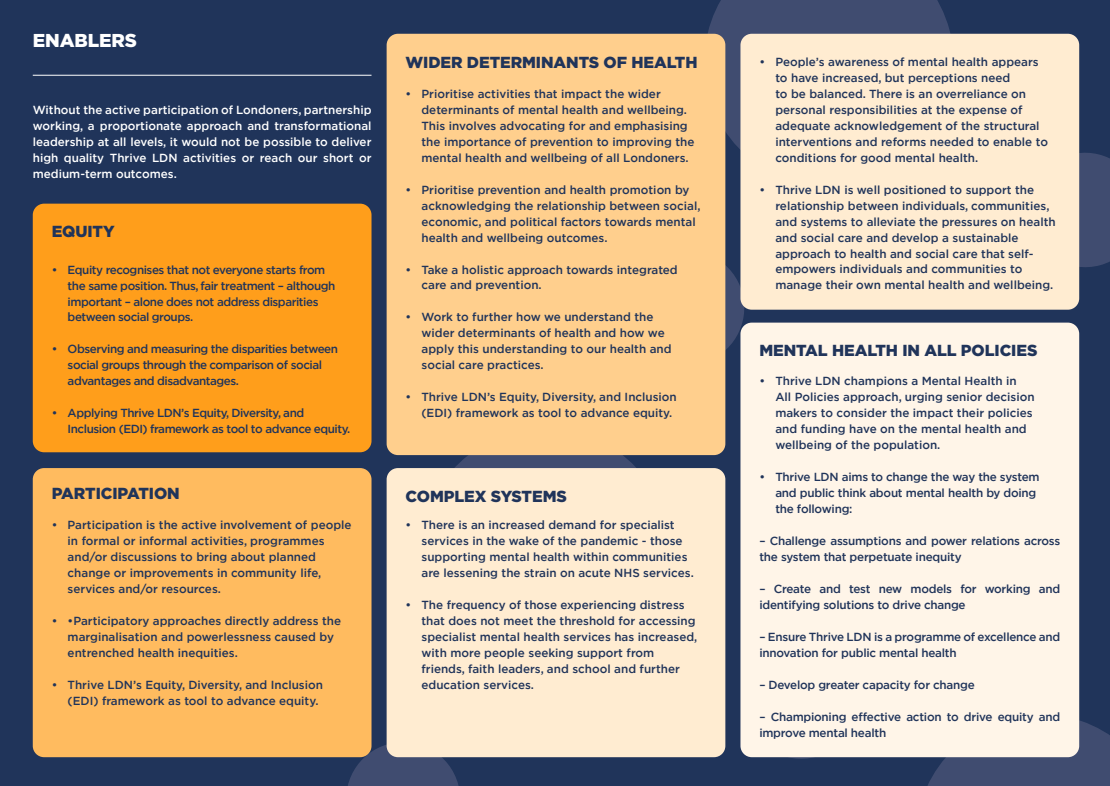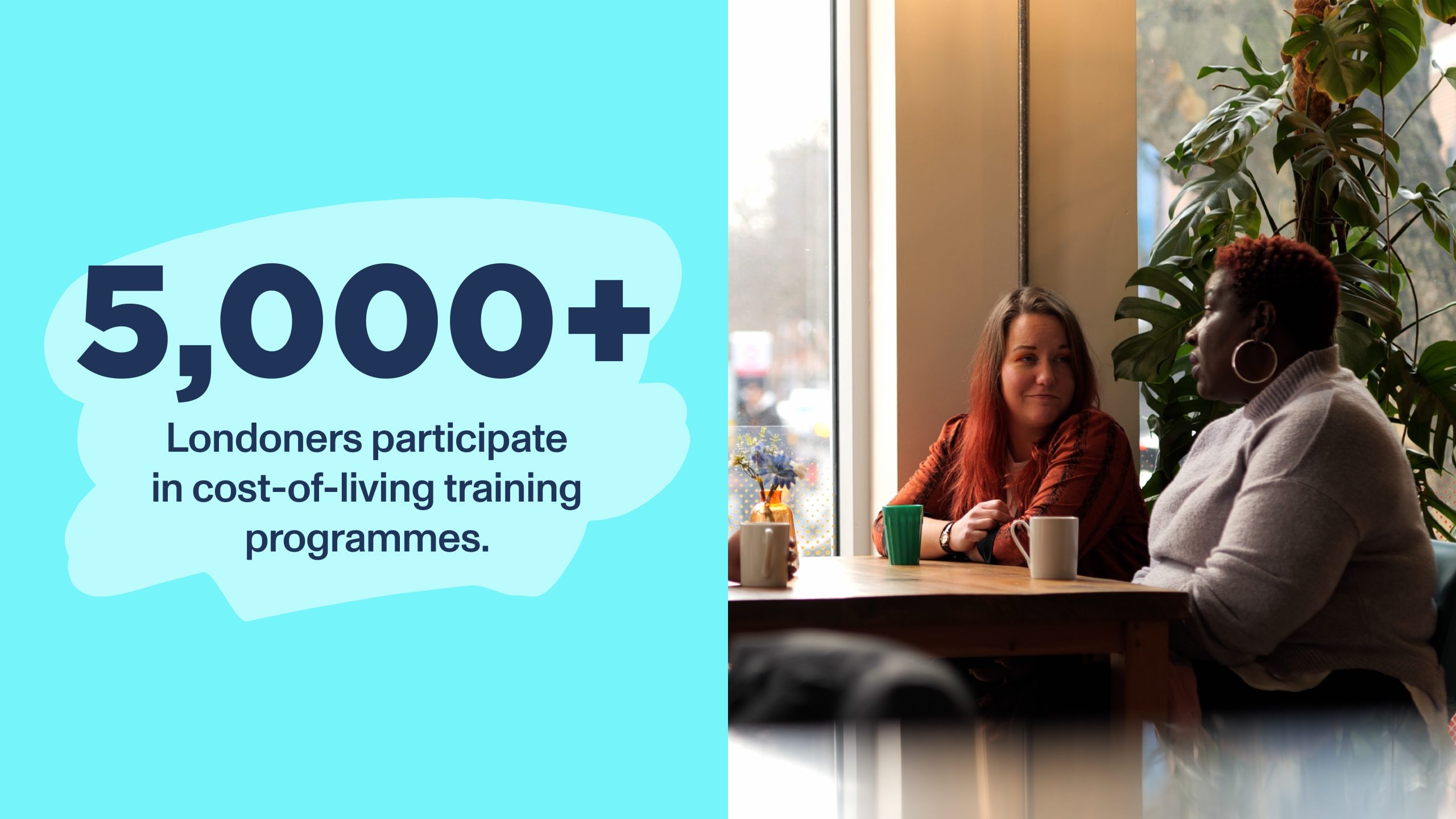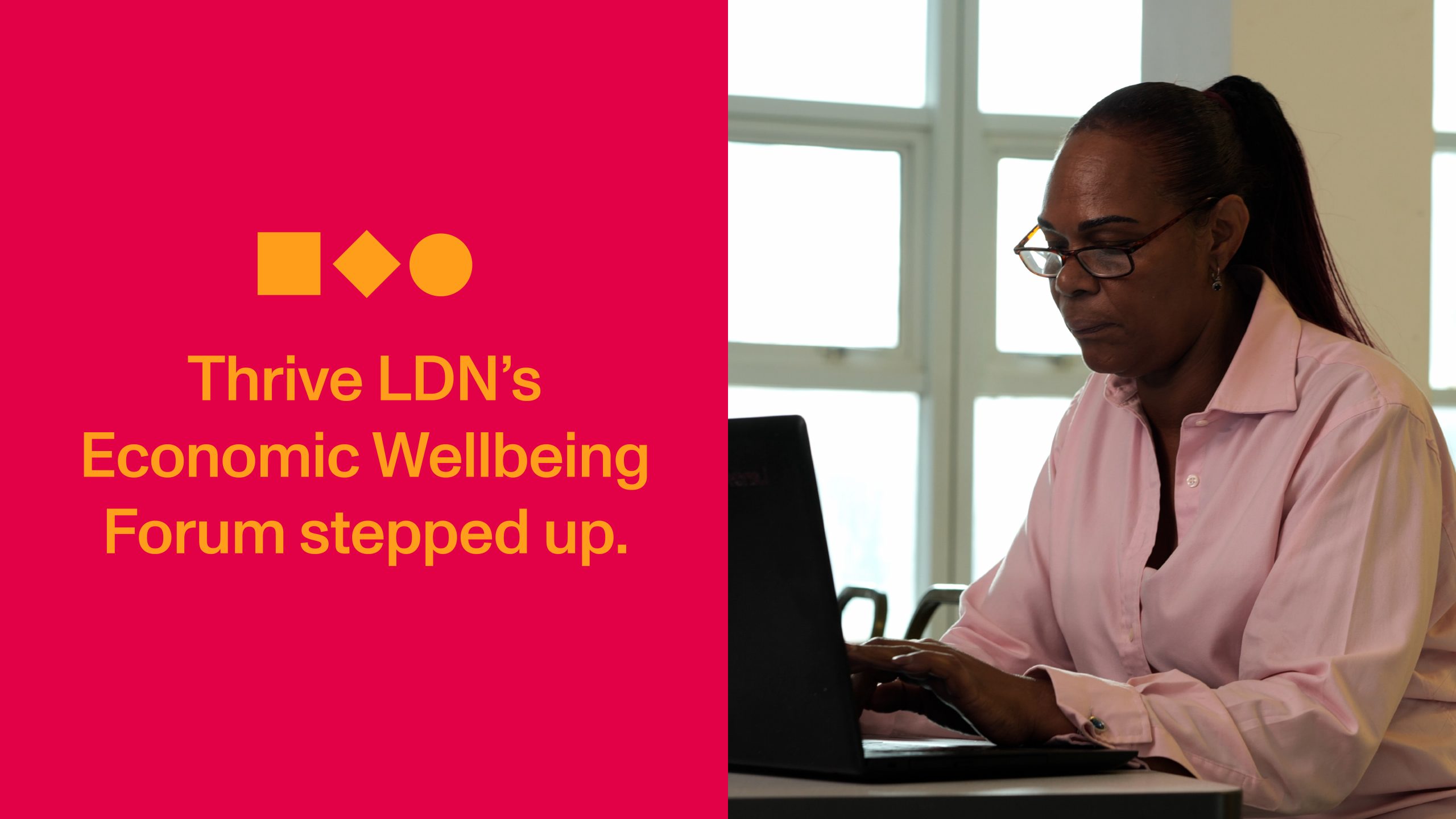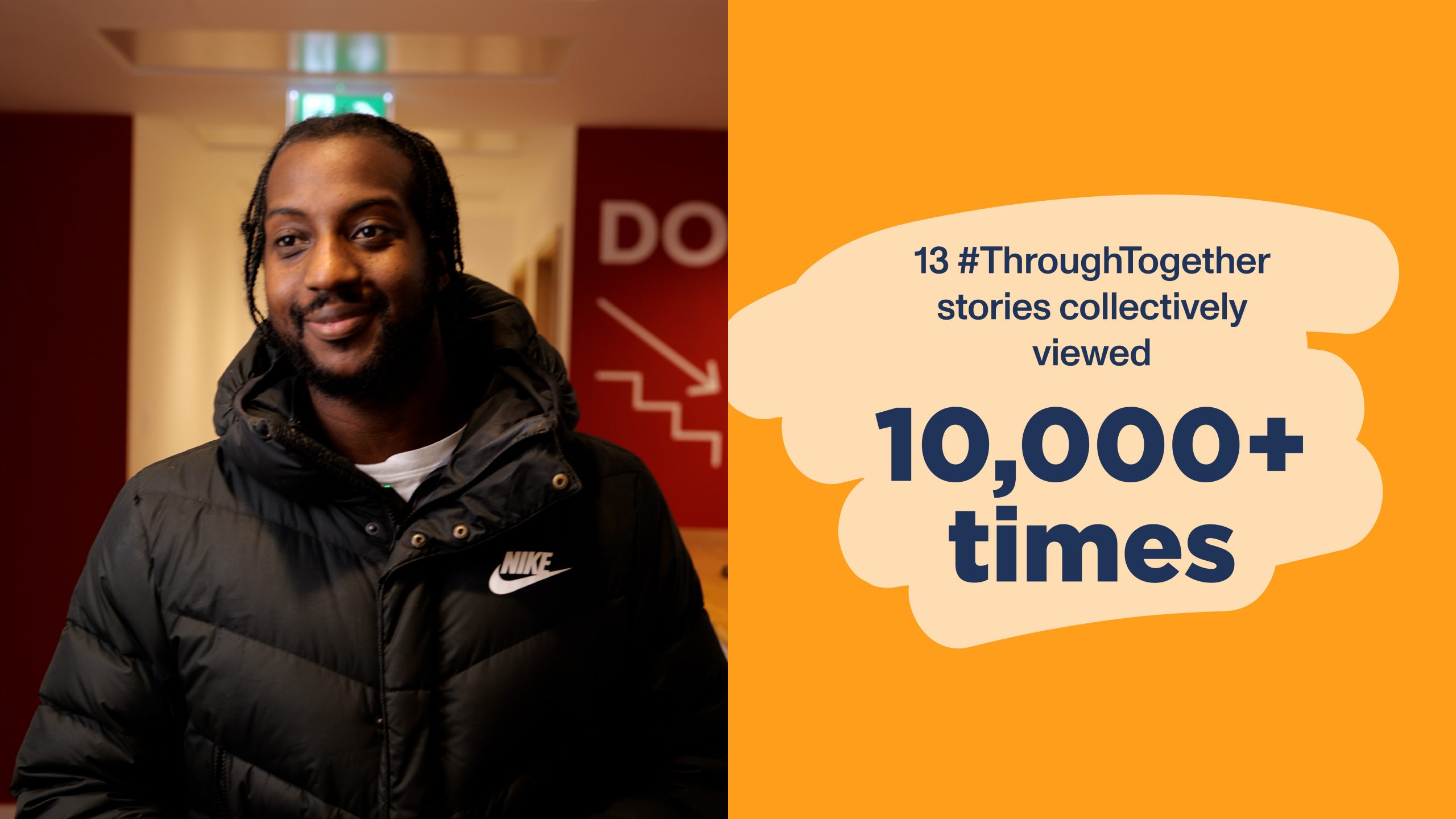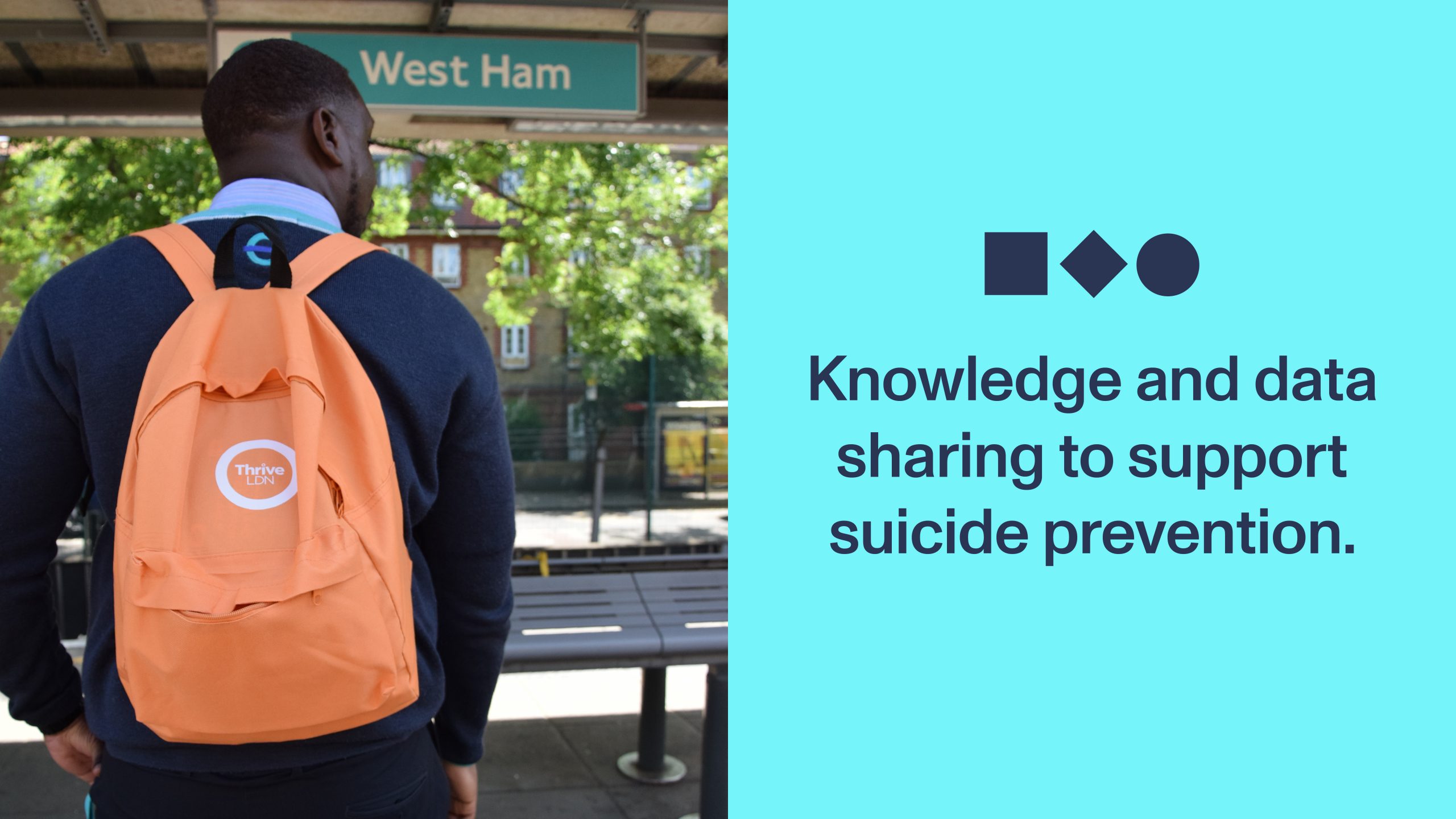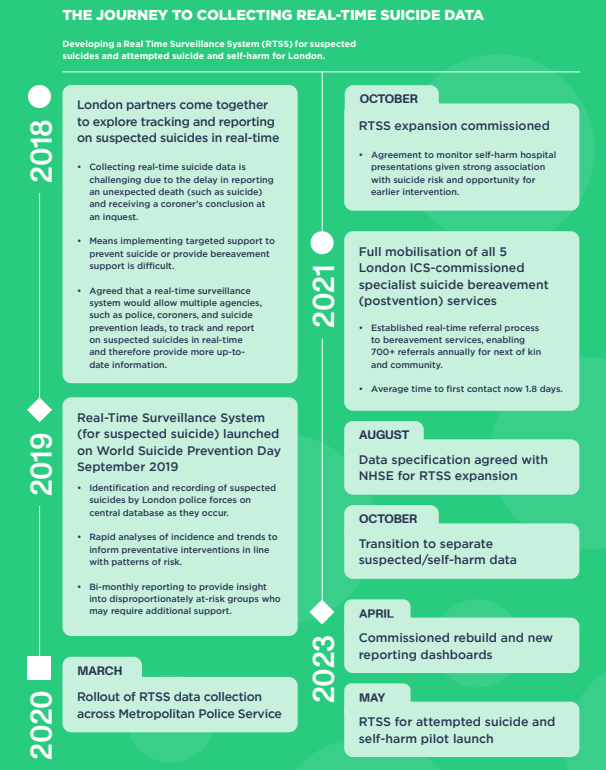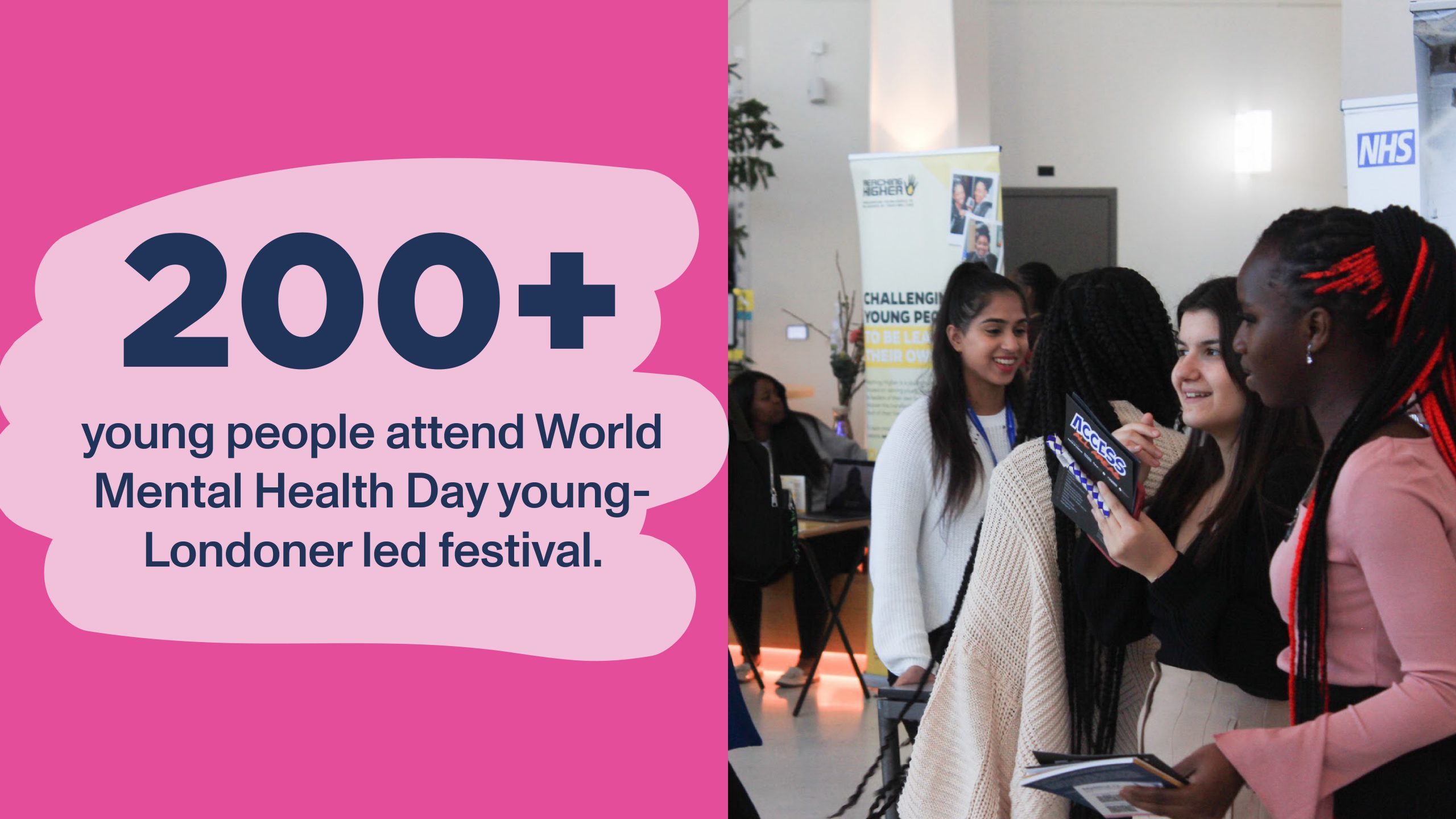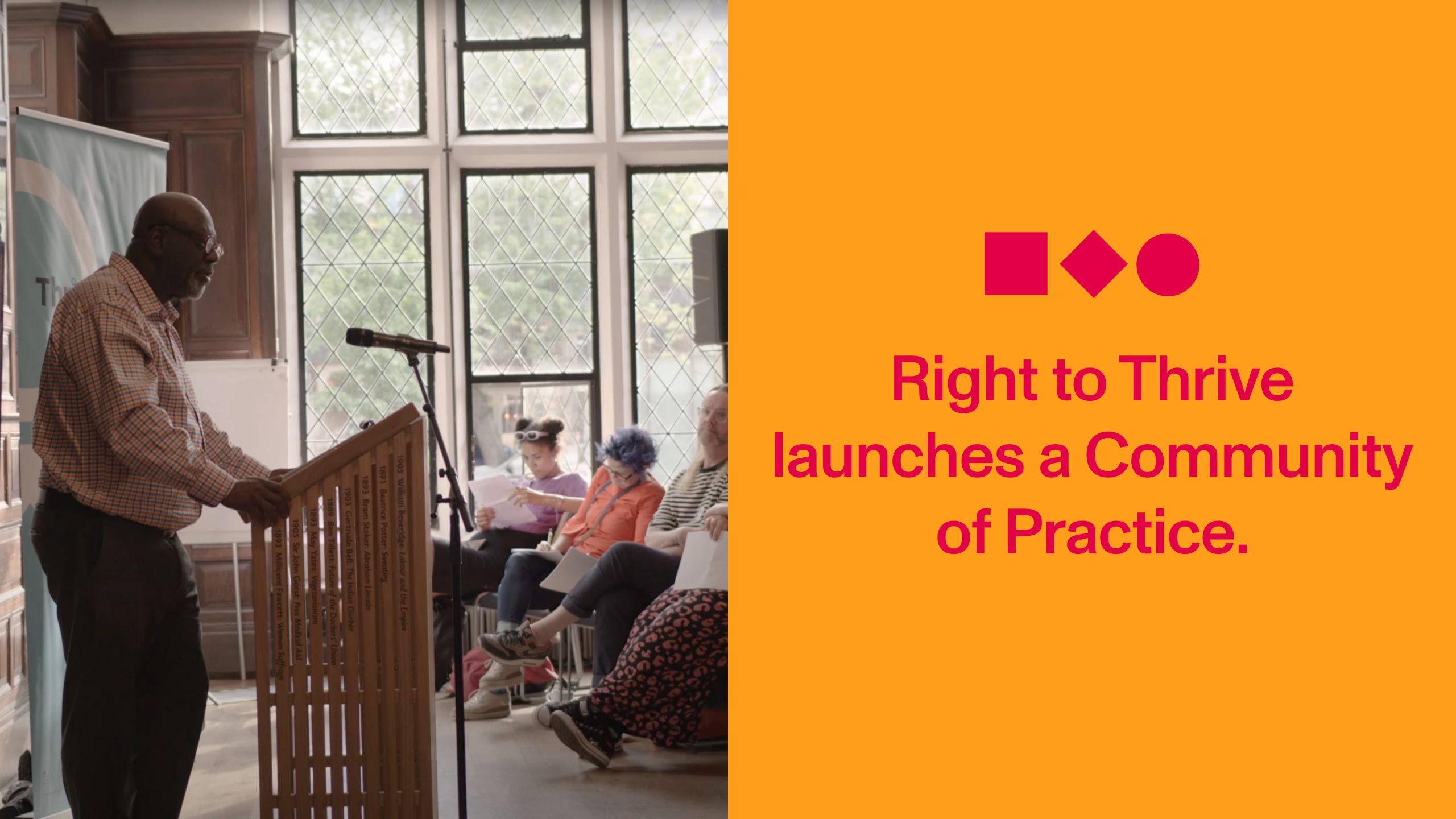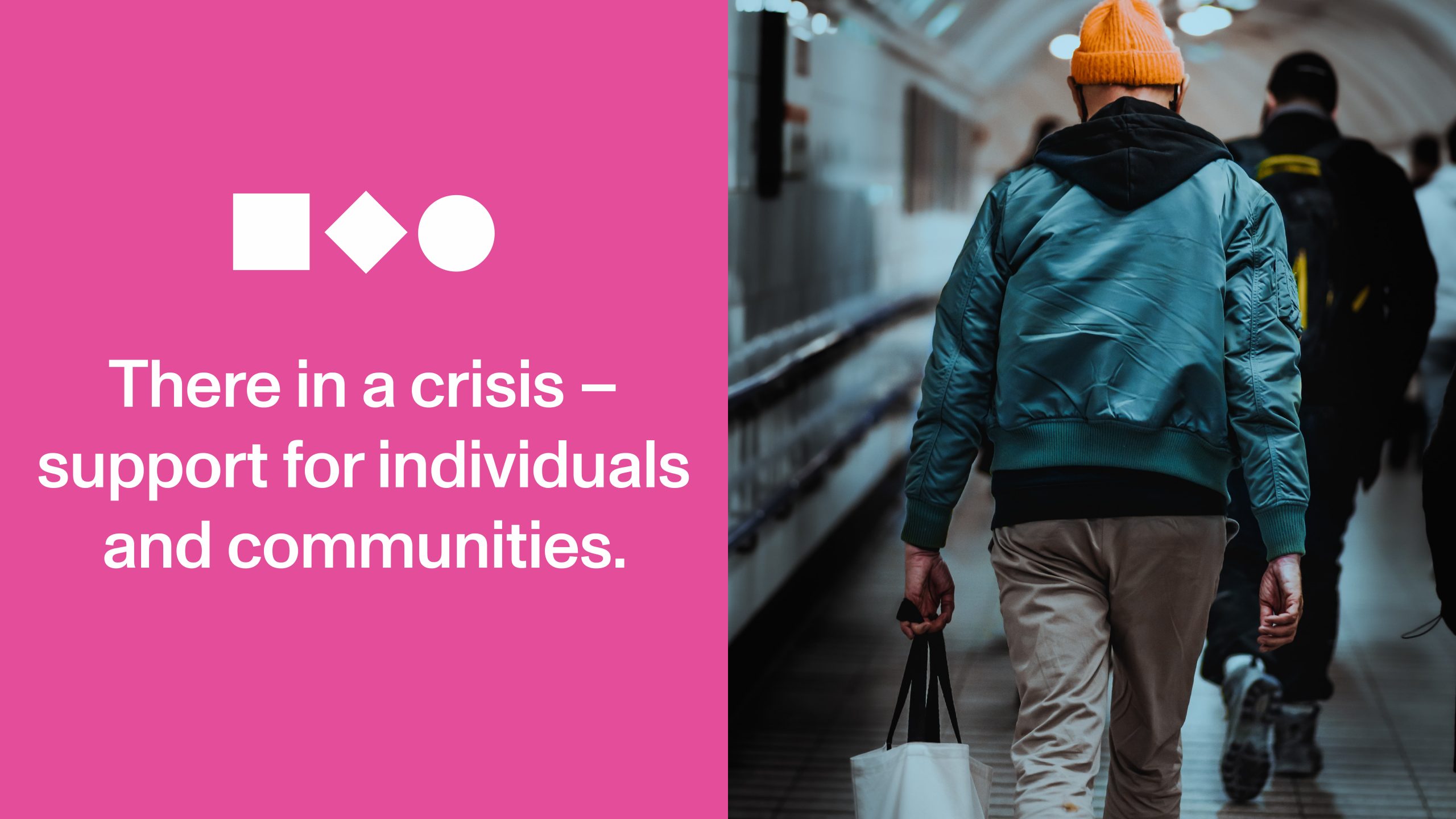
Thrive LDN's Impact Report for 2022-23
A spotlight on Thrive LDN’s work and partnerships during 2022/23, alongside reflecting upon Thrive LDN’s role and voice in London’s health and care system six years on from being launched.
A spotlight on Thrive LDN’s work and partnerships during 2022/23, alongside reflecting upon Thrive LDN’s role and voice in London’s health and care system six years on from being launched.
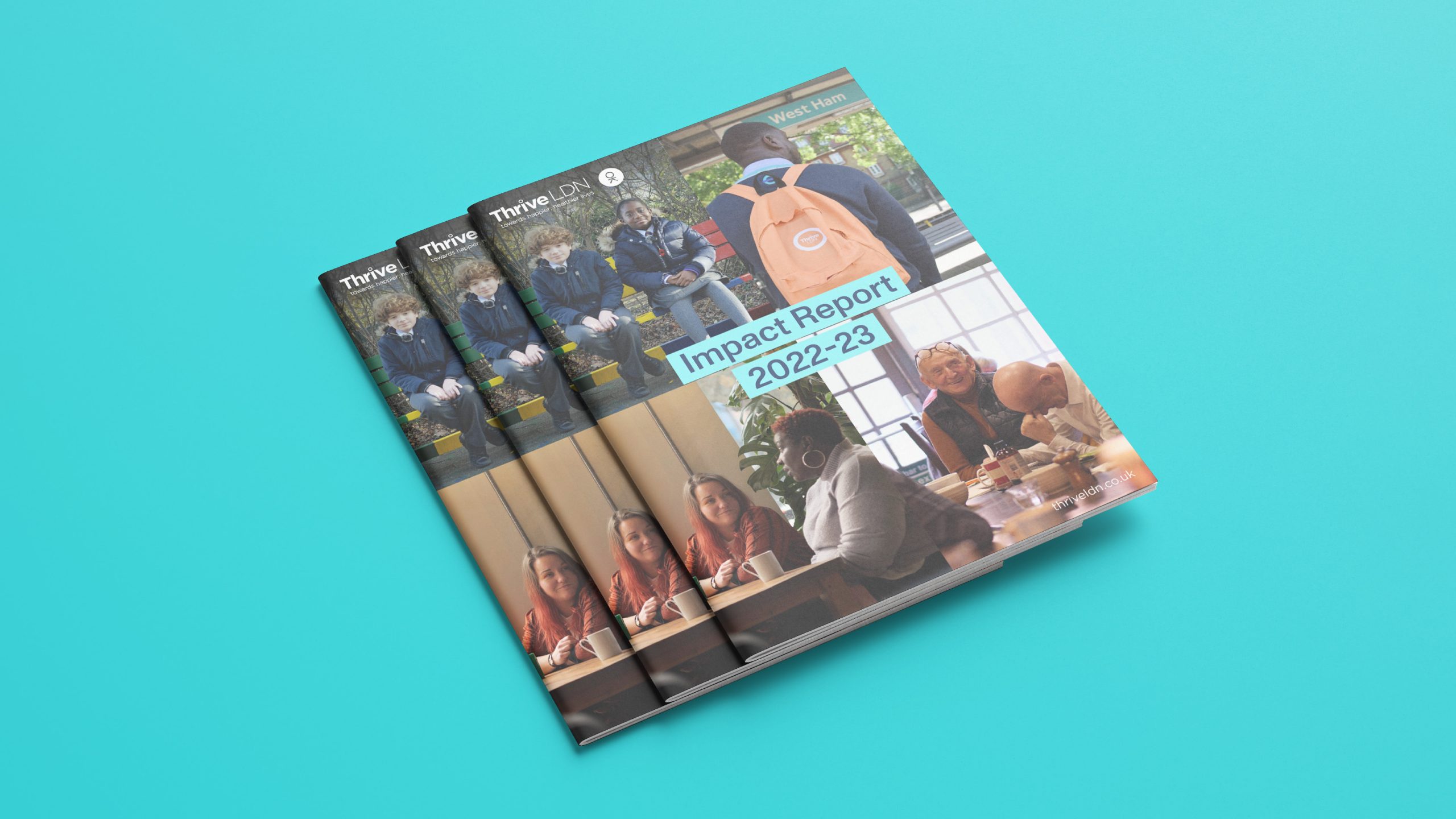
Report
Updated: 04/07/2023
PDF download
Download a designed version of this report in PDF.
01. Executive summary
Executive summary: Getting through this together
Thrive LDN is a citywide public mental health partnership to ensure all Londoners have an equal opportunity for good mental health and wellbeing.
We publish this Impact Report for 2022/23 as Thrive LDN marks six years since being launched publicly by the Mayor of London and the London Health Board partners. As a partnership, Thrive LDN brings together organisations from across sectors, creating an infrastructure for prevention, where public mental health is a collective responsibility and a common goal.
In 2017, things began with a series of open discussions with Londoners – to encourage everyone to think, talk and act more when it comes to mental wellbeing. Six years on there has been real progress, demonstrating that we can achieve great things when we work together.
During this time, London, Londoners, and the world has changed dramatically. The onset and recovery from COVID-19 transformed how individuals, communities and systems adapt and survive. In this post-COVID era, with the trust and engagement of London’s communities having been tested and pushed to the limits, a movement for collective and sustainable effort for equity, participation, and the wider determinants of health has surfaced.
Additionally, the London health and social care system has changed considerably over the past six years, with the formation of the London Office for Health Improvement and Disparities and UK Health Security Agency, GLA Public Health Unit and five sub- regional Integrated Care Systems. Whilst positive, these changes have also caused Thrive LDN to adapt and evolve, and to develop new partnerships to meet the changing structures and collective ambitions of partners. Therefore, this year’s report begins with our current understanding of Thrive LDN’s role within the London health and care system.
In direct response to the huge challenges experienced in recent years, we have witnessed and supported innovation and disruption on a new scale. Through recovery from the pandemic, in response to geopolitical unrest in Afghanistan, Hong Kong and Ukraine, combating the environmental emergency, and existing through a cost-of-living crisis, we are constantly learning and deepening our understanding of resilience and levers available to London to adapt to and overcome adversity.
Yet, many Londoners are now more vulnerable than ever before. The lid has been lifted on what influences our opportunity to thrive, demonstrating how social, economic, and racial inequalities limits progress for not only good mental health and wellbeing but also for achieving social justice. It’s never been more important for us to come together, collaborate and share resources to achieve common goals.
2022/23 has arguably been one of the most challenging years for London’s health and social care system. This report is not a comprehensive reflection of all our activities during the last year but instead illustrates the achievements of the partnerships, processes and networks which make up Thrive LDN.
2022/23 achievements
Notably, during a year that proved challenging for many Londoners as they faced increased cost- of-living pressures, we continued to respond to Londoners’ changing needs in relation to how they seek support for their mental health and wellbeing.
In the face of complexity and uncertainty, we have sustained an environment where relationships can be built and nurtured, resources fairly distributed and, partnership working both within and outside the system has informed and enabled community-led change.
Chapters 5 – 8 showcase how we have worked with partners to step up crisis response measures to the cost-of-living crisis. Here we describe how we have fostered networks and knowledge sharing, strengthened community activism, and trained more than 5,000 Londoners to better support themselves and those around them experiencing poor mental health and struggling financially.
Social inequalities impact people’s mental health and wellbeing, with significant implications for their life outcomes. We know that huge variation exists in terms of both experiences and outcomes, depending on who you are and where you live in London. Across chapters 9 – 11 we spotlight how we have delivered targeted support this year. Here we outline the expansion of data sharing to support suicide prevention in London, co-developing multiple initiatives with young people that support their wellbeing, and cross partnership working with more than 500 education professionals on leadership and training opportunities.
In the final chapters of this report, we outline Thrive LDN’s adaptive approach to initial public mental health responses to wider crises that have an impact on Londoners’ wellbeing, including this year supporting Turkish, Kurdish, and Syrian Londoners’ mental health needs. We conclude by spotlighting how this year we have developed an Equity, Diversity and Inclusion (EDI) Framework for Thrive LDN which has supported the delivery of more accessible, inclusive, and responsive activities to Londoners and their communities, including those from racialised and minoritised groups.
Of course, there is still much more for us to learn and achieve but we believe our foundations and purpose are stronger than ever. Through our collective efforts, each spotlight demonstrates the positive impact that public mental health interventions can have.
Anticipating difficult political- economic conditions in the future
Currently, London has a strong foundation for public mental health strategy across the health and social care partnership as outlined within Towards happier, healthier lives. However, we know from experience that 2023/24 and the future ahead is likely to be challenging with both known and unknown situations emerging, impacting London’s opportunity for good mental health and wellbeing.
We are ambitious about the future of public mental health in London. This ambition is reinforced by a strong commitment from all parts of the system who are coming together to break down the siloed working, democratise how knowledge is produced and challenge processes for translating evidence into action.
It is only through continued efforts to support whole communities to come together and address the causes of poor mental health that we can meet our shared vision of all Londoners having an equal opportunity for good mental health and wellbeing.
Our thanks to all those who have supported Thrive LDN and worked with us this year. There continues to be no shortage of challenges facing London and we look forward to building on the work described in this report.
You can get involved and join the conversation now:
- Across all social media channels using #ThriveLDN or @ThriveLDN.
- Send us an email to info@thriveldn.co.uk
02. A distinct role, a trusted voice
Thrive LDN: A distinct role, a trusted voice
Thrive LDN is a citywide public mental health partnership established to ensure all Londoners have an equal opportunity for good mental health and wellbeing.
As a partnership, Thrive LDN brings together organisations from across sectors, creating an infrastructure for prevention, where public mental health is a collective responsibility and a common goal. In this report we spotlight just some of the work undertaken by Thrive LDN and partners during 2022/23 to help paint a picture of this in action.
The cross-collaborative action between individuals, communities, and systems outlined in this report has been enabled through financial support from across health and care partners, with reoccurring commitment from the Mayor of London, Office for Health Improvement and Disparities (OHID) London, local government, and the NHS, both regionally and sub-regionally through London’s integrated care systems (ICSs). This dynamic partnership, governance and leadership ensures that Thrive LDN can leverage both the principles of subsidiarity and collectivism to deliver meaningful outcomes at the right level for Londoners.
Over time Thrive LDN’s role has evolved and adapted depending on the needs of Londoners and the system. Our agile approach enables us to balance the need to be responsive to the latest situation against anticipating what might be on the horizon. As illustrated in our Theory of Change, we embrace change and enable an environment of transformation and growth for public mental health in London through collective and sustainable effort for equity, participation, and the wider determinants of health.
In 2023, six years on from launch, Thrive LDN represents a cultural shift towards integration across the region, providing an independent and diverse voice to the health and care system, advocating on behalf of those with lived experiences of poor mental health and inequality, whilst also providing a link through trusted relationships with individuals and communities.
The power and role of individual and collective action cannot be understated within Thrive LDN. In order to effectively advance social change, we know that Londoners need to be motivated, able, and prompted to act, and be at the centre of all action. We do this through building relationships, distributing resources, and utilising existing partnerships both within and outside the system to inform and enable community- led change. Our approach to participation has been designed to meet people where they are and develop a deeper understanding of our diverse population needs and lived experiences, generate opportunities to share knowledge and integrate feedback loops from communities to the health, social care and political system.
The relationship between Thrive LDN, the system and the public is unique across London, and is fundamental to the success of the citywide partnership. The trust built over the past six years has enabled widespread meaningful engagement, through accessing new and diverse perspectives and strengthening social ties. Additionally, our work is distinctive to other parts of the health and care system as we practice democratic accountability through our political leadership and accountability to the London Health Board.
Thrive LDN’s voice and role within the complex system which makes up London cannot be neatly defined. Our voice is part of an active conversation with Londoners, creating dialogue and routes to engagement. Interactions are non-linear. Our role is dynamic and adapts based on the context in which we operate. Overall, Thrive LDN exists to provide challenge and advocate on behalf of those with lived experiences of poor mental health and inequality.
03. Theory of Change
Thrive LDN’s Theory of Change
ACTIVITIES
• Focusing on systemic inequity though Right to Thrive to produce evidence of how and why intersectional and community-led approaches work
• Prioritising children and young people’s voices
• Community-led mental health promotion campaigns
• Participatory action research and insights gathering used to shape strategy
• Growing the evidence base for public mental health through research & evaluation
• Coordinating a public mental health response to crises
• Supporting development and capacity building of local mental health champions
• Embedding and resourcing lived experience, leadership & feedback loops
↓
SHORT-TERM OUTCOMES
• Londoners come together to gain knowledge and share lived experience
• Campaigns are rooted in health promotion and public mental health theory
• Collaboratively develop and promote mental health and suicide prevention resources
• Public mental health strategy for London informed and by insights
• A coordinated communications infrastructure on behalf of the system
• Real time surveillance of suspected suicides, attempts and self-harm to inform suicide prevention and risk reduction
↓
MEDIUM-TERM OUTCOMES
- Capacity and skills are built through training, knowledge sharing, and networks
- Intersectional and community-led approaches are championed to empower marginalised and racialised Londoners
- Increase in number of participants, partnerships and platforms to scale and spread messages across London communities and social networks
- A collation for public mental health through convening partnerships in academia, health and social care
- Innovation and development of novel solutions that attend to the wider determinants of health to promote mental health and resilience
- Surfacing and challenging inequitable power structures
↓
LONG-TERM OUTCOMES
• A systemic approach to embedding public mental health in all action, engagement, policy and improvement for London
↓
IMPACT
• All Londoners will have fair and equal exposure to the social, economic and physical factors which shape good health and wellbeing
04. Enablers
Enablers
Without the active participation of Londoners, partnership working, a proportionate approach and transformational leadership at all levels, it would not be possible to deliver high quality Thrive LDN activities or reach our short or medium-term outcomes.
EQUITY
• Equity recognises that not everyone starts from the same position. Thus, fair treatment – although important – alone does not address disparities between social groups.
• Observing and measuring the disparities between social groups through the comparison of social advantages and disadvantages.
• Applying Thrive LDN’s Equity, Diversity, and Inclusion (EDI) framework as tool to advance equity.
PARTICIPATION
• Participation is the active involvement of people in formal or informal activities, programmes and/or discussions to bring about planned change or improvements in community life, services and/or resources.
• •Participatory approaches directly address the marginalisation and powerlessness caused by entrenched health inequities.
• Thrive LDN’s Equity, Diversity, and Inclusion (EDI) framework as tool to advance equity.
WIDER DETERMINANTS OF HEALTH
• Prioritise activities that impact the wider determinants of mental health and wellbeing. This involves advocating for and emphasising the importance of prevention to improving the mental health and wellbeing of all Londoners.
• Prioritise prevention and health promotion by acknowledging the relationship between social, economic, and political factors towards mental health and wellbeing outcomes.
• Take a holistic approach towards integrated care and prevention.
• Work to further how we understand the wider determinants of health and how we apply this understanding to our health and social care practices.
• Thrive LDN’s Equity, Diversity, and Inclusion (EDI) framework as tool to advance equity.
COMPLEX SYSTEMS
• There is an increased demand for specialist services in the wake of the pandemic – those supporting mental health within communities are lessening the strain on acute NHS services.
• The frequency of those experiencing distress that does not meet the threshold for accessing specialist mental health services has increased, with more people seeking support from friends, faith leaders, and school and further education services.
• People’s awareness of mental health appears to have increased, but perceptions need
to be balanced. There is an overreliance on personal responsibilities at the expense of adequate acknowledgement of the structural interventions and reforms needed to enable to conditions for good mental health.
• Thrive LDN is well positioned to support the relationship between individuals, communities, and systems to alleviate the pressures on health and social care and develop a sustainable approach to health and social care that self- empowers individuals and communities to manage their own mental health and wellbeing.
MENTAL HEALTH IN ALL POLICIES
• Thrive LDN champions a Mental Health in All Policies approach, urging senior decision makers to consider the impact their policies and funding have on the mental health and wellbeing of the population.
• Thrive LDN aims to change the way the system and public think about mental health by doing the following:
– Challenge assumptions and power relations across the system that perpetuate inequity
– Create and test new models for working and identifying solutions to drive change
– Ensure Thrive LDN is a programme of excellence and innovation for public mental health
– Develop greater capacity for change
– Championing effective action to drive equity and improve mental health
05. Upskilling and capacity building
Upskilling and capacity building
In the 12 months running up to September 2022, the cost of living surged by a total of 10.1%[1]. The number of people with lived experience of financial worries and mental health issues has reached critical levels in London. This was emerging as we were entering a testing winter period and Londoners again faced a challenging and uncertain time with the economic crisis and wider threats, which were being felt unevenly across London.
In November 2022, Thrive LDN stepped up crisis response measures to the cost-of-living crisis. We worked with various partners to provide a series of training programmes to support individuals helping those affected by increased cost-of-living pressures in London. Funded by the Mayor of London, more than 5,000 people were trained to better support themselves and those others experiencing financial struggles.
The first training programme was Core Conversations in partnership with training provider Basis who co- developed the training with 200 front-line experts.
Centred on seven principles of caring and great conversations, this interactive training focused on supporting Londoners with lived experience of financial worries, mental health issues, and those with no capacity to save and prepare for future economic shocks.
Through forum theatre, 15 London borough specific and five pan-London training sessions enabled 265 participants to experiment with alternative approaches to having meaningful conversations.
As a result, the training improved people’s ability to support others and encourage open conversations around mental health and wellbeing.
44 people from these initial sessions joined the train- the-trainer programme, committing to cascading the learning across their boroughs and grassroots organisations with an anticipated reach of an additional 1,200 Londoners.
A series of 30 interactive, live training webinars on mental health awareness and financial hardships were delivered in partnership with Healthy Dialogues. The training, aimed at London’s key workers and community champions, focused on what mental health is and where to find support. Additionally, it included conversational skills for brief interventions to engage people empathetically when talking about mental health and wellbeing, including financial wellbeing, and how to support someone experiencing a mental health crisis.
Almost 400 people took part in the training series, and more than 500 modules were completed by the participants. The online sessions were popular, with an average of 70% attendance across all three modules. Each of these modules have been recorded separately and are now available to view at any time from the Thrive LDN website.
The Gift of Reconnection: Trauma-Informed Practice Training was the third training programme commissioned to support with the cost-of-living response. This pre-recorded online, open access, multi-level programme was launched to support people working across a range of contexts to develop trauma-informed approaches to practice within their role. The training comprises eight chapters across three levels, bronze, silver, and gold, and is available for open access on Thrive LDN’s website.
By participating, individuals and organisations were supported to understand the impact of trauma and work to implement principles of trauma-informed practice in their everyday work and life. As a result, thousands of Londoners have committed to practicing trauma-informed care.
Following the training, this cohort is now informed on trauma and loss, understanding the complexity of developmental trauma and how to integrate a trauma-informed approach into practice. By May 2023, around 2,750 people have accessed the training so far, consuming more than 1,200 hours of training content across all three levels.
The training programmes focused on building relationships with others in the community, forming a holistic understanding of the challenge at hand, and co-creating solutions to overcome them. An independent evaluation report for the training programmes will be published in the autumn.
Core Conversations in numbers
- 20 training sessions, 15 London borough and 5 pan-London.
- 265 participants practiced alternative approaches to having meaningful conversations.
- 90% said they’d use the learning in their work.
- “I am a Councillor and Mental Health First Aider and I run my own community support group for women and girl survivors of domestic abuse, but I still felt the training was very impactful in helping me to develop my softer skills and considering how my approach is making the client feels which can then impact on the client’s level of engagement.”
- “This was one of the most useful courses I have ever attended. I usually hate roleplay, but when we were asked to do it in our group I found it really useful. I liked the way the facilitators roll-played [sic] badly and then changed it at our request. I think this way of teaching is really helpful.”
- “This course has helped me to be more aware about the problems that people have and has taught me tools to have a closer and more open conversation.”
Mental Health Awareness training in numbers
- Almost 400 people took part in the training series.
- More than 500 modules were completed by participants.
- “I learnt so much today. It introduced me to a whole range of techniques and strategies which will help me in the future to recognise poor mental health and be able to provide information, support and guidance to the participants.”
- “I attended module B and C. Loved the PAPA tool. Also bringing into awareness the trauma informed practice which made me understand that although I am not specifically trained in that, I do have awareness of trauma and therefore demonstrate those abilities.”
- “I found it very effective, and the methods used were current and relevant. I found the trauma informed information of vital importance and everyone on some level has experienced some level
of trauma whether acknowledged or unacknowledged, loved the break-out rooms would have loved more interactive processing and breakout rooms.” - “The training and group work conversations really helped to practice the learning. Leaving me more confident to at least open discussions about MH [mental health] and identifying how to help someone that may be struggling with their MH.”
The Gift of Reconnection in numbers
- By May 2023, around 2,750 people have accessed the training.
- Consuming more than 1,200 hours of training content across all three levels.
- “The effectiveness was really good. I already knew some of the information but it was good to check my knowledge again and learn again that there are only a couple of main things that
we need to be mindful of like a non-judgmental approach, compassion etc.” - “Trauma informed care is everyone’s business and in order to make services trauma informed these training sessions are very important.”
- “I found this training to be so valuable. I learnt so much, particularly around the “7 Areas of Impact”, which will not only be valuable during my job role with the young people that I work with but also in my own personal life.”
- “I found the bronze level training to be incredibly thorough and helpful in reframing how I might view and interact with individuals who have experienced trauma or poor mental health.”
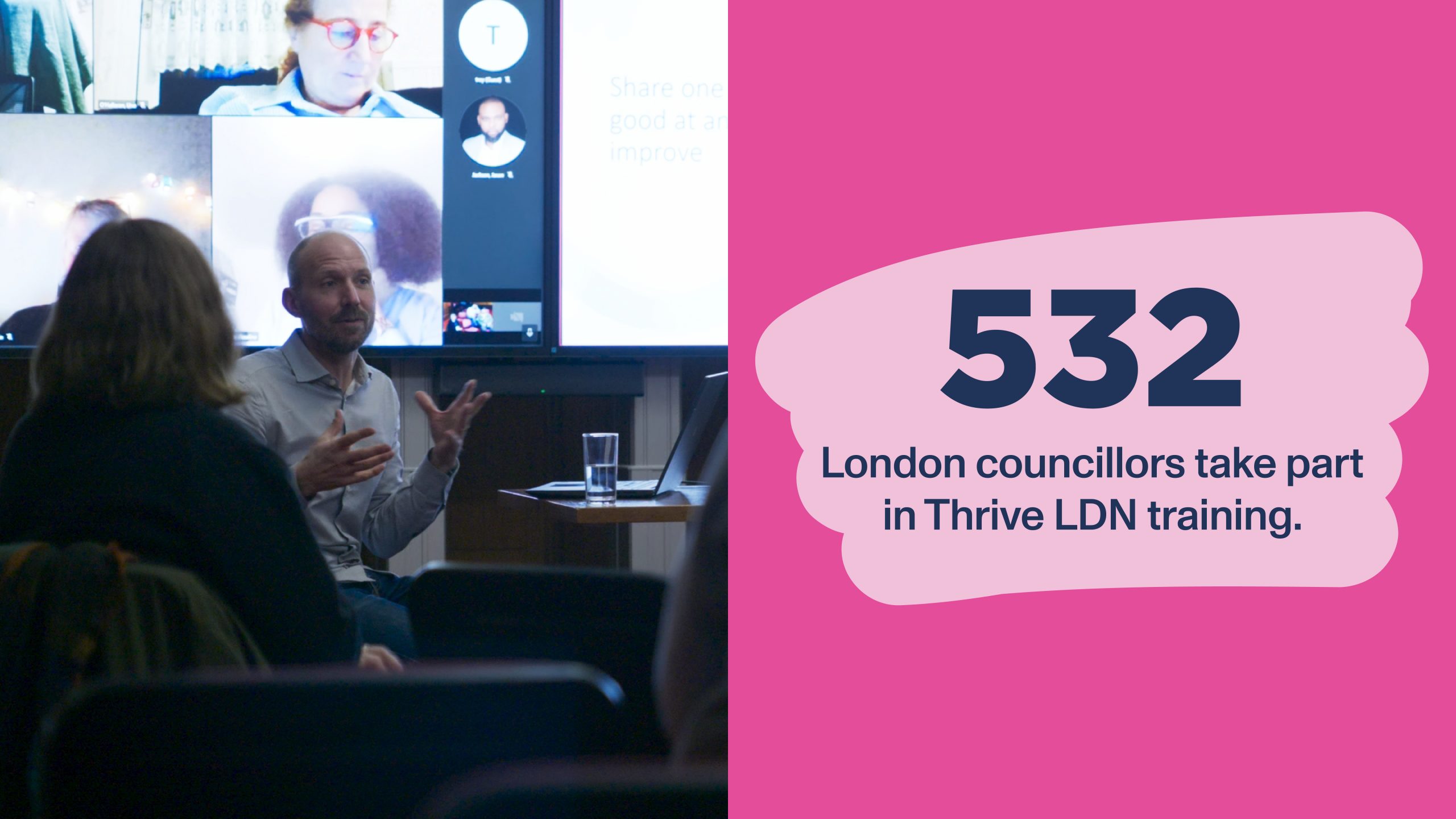
Elsewhere, this year hundreds of councillors from all 32 boroughs and the City of London have taken part in a two-hour training session which defined mental health and illness and gave evidence-based advice on looking after individual and community mental health.
Led by mental health and local government expert, Ed Davie, a total of 532 councillors, more than 1 in 4 of all London councillors, took part in the training. The sessions were designed to improve their own mental health and change policies in their councils to support better mental health in their communities.
In feedback, 94% of trainees rated the training ‘Excellent/Good’. The training has been put forward to be evaluated by the National Institute for Health Research and, separately, by a King’s College London masters’ student. If researchers find that the training led to beneficial policy changes in councils which have had a discernible benefit to people’s mental health, then a wider rollout will be explored.
[1] Office for National Statistics (2022) Consumer price inflation, UK: September 2022: Consumer price inflation, UK – Office for National Statistics.
06. London’s Economic Wellbeing Forum
Facilitating London’s Economic Wellbeing Forum
London experiences huge inequalities in wealth and shared opportunities. Prior to the pandemic, many struggled with the costs of housing, heating, and food with 4 in 10 Londoners not meeting what is deemed to be an acceptable standard of living[2]. As such, the increased cost-of-living pressures which emerged this year have been significant for many across the city and have had a detrimental impact on Londoners’ mental health and wellbeing.
Thrive LDN’s Economic Wellbeing Forum has been stepped up to collectively recognise the impact on population mental health of financial pressures. Initially set up as part of a suicide prevention response during the pandemic, the forum had a specific intention of focusing efforts and offers of support on those from the lowest socio-economic backgrounds and/or belonging to communities which have historically been marginalised and socially excluded.
Throughout 2022/23, the forum has been shaping the development of a public mental health response to those dealing with the cost-of-living crisis and emerging economic pressures, particularly on timely ideas for training and resources. Members have reiterated that problem debt is one of the biggest issues having a profound impact on mental health.
Moreover, the forum has uniquely fostered networking and knowledge sharing among participants. By bringing together a broad range of statutory partners, community organisations and those from the workplace/ business sectors, it has created a supportive platform that streamlines signposting efforts, provides ideas for training and resources, and raises awareness of both new and existing support services.
Since inception, the forum has provided a virtual space to bring together professionals, partners, and community organisations to:
1. Collaboratively develop and promote mental health and suicide prevention resources tailored to Londoners who are experiencing debt or financial anxiety resulting from the COVID-19 pandemic and ongoing cost-of-living crisis.
2. Come together to share intelligence, good practice, and foster collaboration across London to support individuals facing debt or financial anxiety.
3. Gain insights from collective efforts to support Londoners’ mental health and wellbeing during the cost-of-living crisis.
4. Identify and provide additional support or signposting for groups in need, considering the differential impact on people with intersecting protected characteristics.
5. Focus efforts and support on individuals from the lowest socio-economic backgrounds and historically marginalized communities.
When asked what they found useful about the forum, forum members told us:
• The wide range of topics discussed
• Partner updates and opportunity for discussions from multiple perspectives
• The wide variety of speakers and the range of updates
• Hearing from partners as to what they are doing pan London
• “(It is) one of the best sources of insight and information offered in London.”
• “I’ve already connected with several partners and hope to work with others soon.”
• “It was impressive how many partners were able to give succinct and helpful updates in such a short space of time.”
The Thrive LDN Economic Wellbeing Forum continues to create a positive impact by supporting the economic wellbeing and mental health of Londoners through proactively identifying and preparing for future challenges that Londoners may encounter. If you’d like to be involved with the forum, get in touch for details of future meetings.
[2] Padley, M. et al, 2021. A Minimum Income Standard for London 2020. Centre for Research in Social Policy Loughborough University. Accessed June 2023.
07. Campaigning together for change
Campaigning together for change
We have continued to play a leading role in the coordination of public mental health communications and campaigns.
Accurate and relevant health information plays a vital role in mental health promotion and improving individual and community health.
During 2022/23, we have continued to play a leading role in the coordination of public mental health communications and campaigns on behalf of London partners to meet this challenge and make the best use of finite resources.
We have created an infrastructure for health communications and campaigning which is constantly evolving and adapting, anticipating and responding to the ways in which Londoners are seeking and engaging with support for their mental health and wellbeing. This is done through a highly networked and coordinated approach to co-producing resources, toolkits and campaign materials, a pragmatic approach to user testing and direct engagement with Londoners from diverse communities.
Our community-led campaigns Getting Through This Together and Great Mental Health Day 2023 were designed to actively avoid a narrative which dilutes the importance of context and collectivism and places the burden on the responsibility of individuals.
In autumn 2022, Thrive LDN launched the Getting Through This Together campaign in response to the increased cost-of-living pressures. The campaign aimed to encourage Londoners to strengthen their social networks with family members and friends, and trusted others in their community, as well as highlighting the professional support and advice services available. The campaign centred on a resilience-based narrative which looked to protect and enhance people’s mental wellbeing. It directly supported the London Office for Health Improvement and Disparities’ (OHID London) Winter Resilience and Prevention Framework.
The campaign’s user-testing highlighted the need to humanise the cost-of-living crisis by centring the lived experiences of those most impacted and amplifying their voices to influence change. As part of the campaign, thirteen #ThroughTogether stories ranged from ‘Meet Up Mondays’ in a Wimbledon pub, to song writing, rap and spoken word with young Londoners in Woolwich, as well as a family centre helping to provide empowerment and build confidence near Battersea Park.
The stories collectively enjoyed more than 10,000 views and shone a light on the power of community kindness across the capital, the importance of collectivising, and provided a strong narrative to complement Great Mental Health Day 2023.
In January 2023, Thrive LDN hosted London’s second Great Mental Health Day (GMHD) to get Londoners talking about mental health, destigmatise asking for help and to raise awareness of the great support available locally across the capital.
The theme for the day was the celebration of the power of community kindness and was designed to tell the story of how Londoners have come together for one another during a challenging winter period.
It gave them the opportunity to celebrate people and communities they felt deserved recognition. The response to GMHD 2023 from Londoners, both individuals and organisations, was overwhelmingly positive. It built on the support collectively shown to the event from London partners the previous year, seeing an increased scale and spread of activity taking place right across the city.
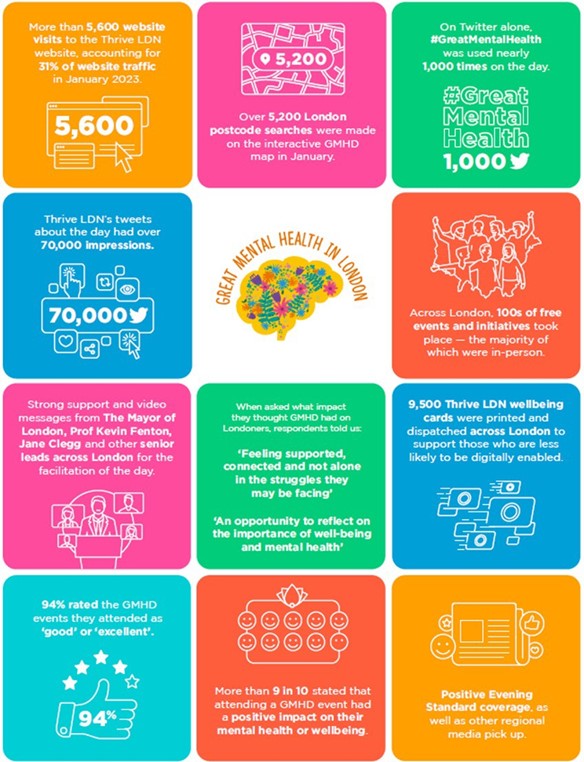
08. Listening to Londoners
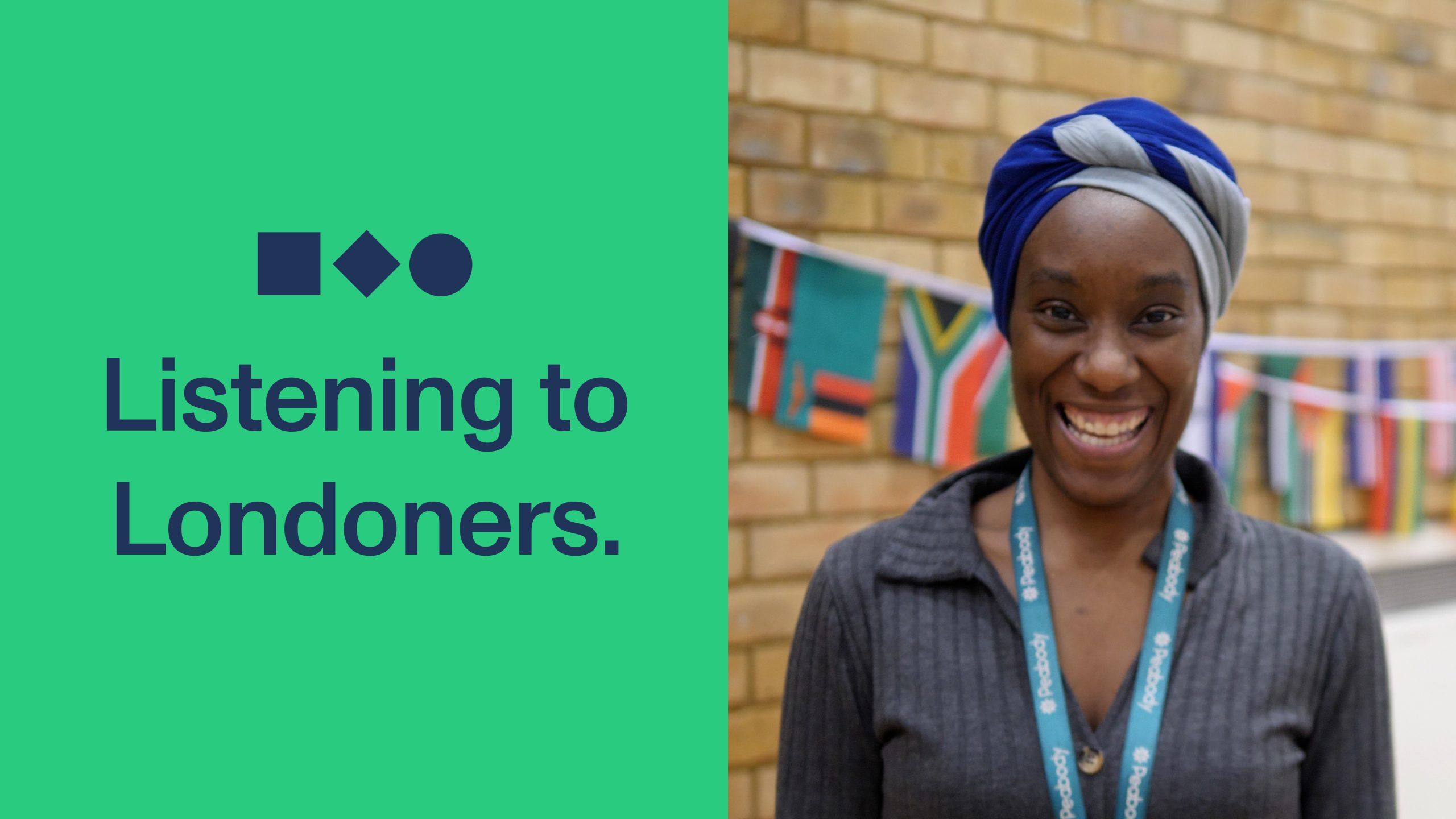 Listening to Londoners
Listening to Londoners
During 2022/23 we carried out extensive engagement with Londoners, especially focused on the emerging cost-of-living pressures and our response to this.
The power and value of community-led approaches to drive positive change in the health and social care system cannot be understated. Embedded within Thrive LDN’s research and insights function and outlined in our Theory of Change, we prioritise community
engagement, mobilisation, and collectivising to ensure that we better understand what matters to communities and can act appropriately.
By actively seeking community insights, our aim is to foster a system-wide response and implement targeted interventions. We embrace a softer and flexible approach to information collection, which allows for a rapid and action-oriented flow of information to the health and care system. Moreover, we address existing gaps and the lack of representation in the evidence base by providing valuable information where it is needed the most.
During 2022/23 we carried out extensive engagement with Londoners, especially focused on the emerging cost-of-living pressures and our response to this.
Insights are gathered and surfaced from Londoners’ lived experience through the multiple networks Thrive LDN occupy. This includes the London councillor network, OHID London and ADPH London’s public health network, as well as Economic and Wellbeing Forum, all made up of policy makers, community organisations and lived experience leaders.
Given the dynamic nature of Thrive LDN’s research and insights function, community insights flow from and directly gathered through the various projects across Thrive LDN’s programmes.
Our engagement efforts during the last year spanned diverse groups, helping to ensure a good representation of London’s population. User- testing sessions for the Getting Through This Together campaign were instrumental in uncovering insights related to public mental health challenges. Furthermore, we analysed transcripts of video content from the campaign which enriched our understanding of the issues at hand.
Thrive LDN community insights in numbers…
Across our insights gathering work during 2022/23, we have directly engaged with and listened to Londoners on various topics from cost-of-living support to mental health policies:
• 55 Community or partner organisations supporting frontline work in London
• 63 young Londoners
• 31 elected London councillors
• 5 community champions and leaders
We also collaborated with community organisations in Harrow, Merton, Camden, Greenwich, Waltham Forest, Hackney, and Wandsworth boroughs. We gathered valuable insights from the South London and Maudsley Mental Health Promotion Team, the Latin American Women’s Rights Services community group, and Black Thrive Global.
All these insights have proven invaluable in understanding various aspects of public mental health that impact the lives of Londoners:
• We have ensured that the lived experiences of Londoners are heard and integrated into the health and social care system. By influencing Thrive LDN’s programs and sharing insights with decision-making networks, we have made a tangible difference.
• We have advocated for the application of community insights methodology throughout the health and social care system. By representing the voices and lived experiences of Londoners, we have helped shape public mental health information and interventions.
• Our engagement efforts have fostered a balance of power in the production of knowledge. By engaging with a diverse range of Londoners and understanding their experiences in relation to various public mental health challenges, we have championed inclusivity and equity.
Throughout this year, insights from individuals and communities across London have been translated into actionable recommendations, which we share with partners. Our research and strategy were also shaped by these invaluable contributions. Perhaps most importantly though, this work has positively influenced the wider systemic use of Londoners’ insights, informing social change and action.
09. Suicide prevention
Knowledge and data sharing to support suicide prevention
Suicide is when someone ends their own life. Around 10 people a week take their own life in London.
Thrive LDN is the regional lead for suicide prevention in London on behalf of NHS England. As part of our role, we facilitate the multi-agency Thrive LDN Suicide Prevention Group made up of 39 organisations and 56 individual members. The group oversees the development of regional strategy for suicide prevention, delivers citywide projects to prevent suicide and supports those affected by suicide.
Suicide is complex, but it is preventable. Thrive LDN and partners share the ultimate aspiration of making London a zero-suicide city.
Launched in 2019, Thrive LDN’s Real Time Surveillance System (RTSS) is a source for monitoring individual suspected suicides for the London region. It is co- hosted by the Metropolitan Police Service (MPS) to provide a platform to securely collect and share real-time data on suspected suicides between multiple agencies.
This real-time monitoring of suicide incidence enables more targeted prevention programmes that address identified patterns of suicide within London. Doing so helps to reduce the number of Londoners who take their own life whilst providing invaluable insight into circumstances around suicide and mental health issues in London. Given the known higher risk of suicide of those bereaved by suicide, the system also facilitates real-time referral of those impacted by suicide into NHS-commissioned bereavement services.
During 2022/23, we have been working with partners, particularly those within the NHS and healthcare, on a system expansion to the RTSS to include data on attempted suicide and self-harm. Population-level data on self-harm can help identify local risk groups, support suicide reduction within mental health and acute services, and ensure greater consistency in the provision of follow-up care for vulnerable Londoners. It can also support monitoring of best practice management of self-harm in healthcare settings.
How the Real Time Surveillance System is supporting suicide prevention in London:
• Supported cluster identification, by enabling cross-referencing of submitted cases to review potential demographic, geographic or contextual links.
• Facilitated real-time referrals to bereavement support via postvention services.
• Enabled longitudinal and thematic data analysis on a bi-monthly basis to monitor the impact of the pandemic on suicide incidence in London.
• Highlighted emerging means of suicide, which can be proactively escalated to the Office for Health Improvement and Disparities (OHID).
• The RTSS is recording key information (for example, including age, gender, residential address, plus the day, method, and location of death) with above 98% completion rates.
• An average of 79% of specialist bereavement support service referrals to ICS-commissioned suicide bereavement services are a direct result of referrals made through the RTSS, with an average
Elsewhere, an evaluation of the impact of the London suicide bereavement services took place this year, to ensure the real-time referral pathway is being utilised effectively and that all necessary referral information has been collected.
The journey to collecting real-time suicide data
Thriving Through Culture
Thriving Through Culture is a partnership between Thrive LDN and the Greater London Authority’s Creative Industries and Culture Unit, which has been match funded by The Baring Foundation. Thriving Through Culture is a series of cultural programmes to support children and young people’s mental health and meet the ambitions of London’s Recovery Missions. During 2022/23, notable projects delivered through this partnership included the 2.8 Million Minds and Access All Areas: World Mental Health Day Festival 2022.
The 2.8 Million Minds programme focused on how young people use art and culture to create change in their mental health and change how mental health care is imagined, delivered, and funded.
In May 2022, three groups of young people from Haringey and Tower Hamlets presented their manifesto for young Londoners, A Manifesto for 2.8 Million Minds, to the Houses of Parliament. Reflecting on their own experiences, facilitated by artists Becky, Yomi, Tyreis and Simon as well as partners Madlove, Chisenhale Gallery and Bernie Grant Arts Centre, they highlighted the need and potential for art and culture to transform young people’s mental health structures.
The 2.8 Million Minds Manifesto was shortlisted for the Culture, Health and Wellbeing Alliance Collective Power Award in partnership with Ideas Alliance and Lived Experience Network.
In October 2022, more than 200 young people attend the Access All Areas young-Londoner led festival to mark World Mental Health Day. The festival was delivered in partnership with Living Proof, a youth consultancy, who developed a youth board to curate the festival.
The festival offered a platform for young Londoners to discuss challenges affecting their mental health and wellbeing in the context of access to services and information, and provided a space for young people to have a dialogue with key decision makers in health and care. Members of the festival’s youth board were also interviewed by BBC London on the day of the festival which featured on news bulletins both on radio and television.
Across both projects there was a positive impact felt by those young people actively engaged in them, including:
• An increased sense of confidence
• New skills, including public speaking and working as a team
• Playing a part in some important and developed ideas
• Having their voices heard
• Having the opportunity to be surrounded by like- minded people
• A safe space to be themselves, to ask questions and learn
• Finding new ways of supporting their wellbeing through art and creativity
Feedback from young people attending the festival included:
“I have been thinking about my mental health more and bettering myself so I can support those who also suffer with their mental health.” – WMHD Youth Board Member
“I have developed confidence in myself in putting my ideas forward and also in my ability to facilitate a panel discussion – defo one for the CV! I feel like I also have developed a belief in myself in the knowledge that I have about the topic of mental health – in terms of both its history and its present state and how I can be involved in creating a change that needs to come about. This project has fuelled my passion to be involved in supporting and creating change regarding mental health even more!” – WMHD Youth Board Member
Taking a whole school approach
Placed-based mental health promotion remains effective in building good mental health policies and practices, including taking a whole school approach. In partnership with the Department for Education (DfE) and Office for Health Improvement and Disparities (OHID) London, and the Greater London Assembly, Thrive LDN promoted online webinars on taking a whole school/college approach to mental health.
The webinars were offered to teaching staff, local authorities, children and young people leads in trusts, and other partners across the education sector to raise awareness of a whole school approach and additional funding available to train a senior mental health lead. Adopting a whole school approach to mental health is known to increase wellbeing of staff and pupils, and promote good behaviour, attendance, and learning. Furthermore, children and young people (CYP) spend a substantial proportion of their lives in schools, upskilling those tasked with their education and care is essential.
Overall, 208 individuals participated in the webinars from across 28 London boroughs.
Feedback:
“Thank you so much this has given me a lot to share with my school and help them bring this all together.” – participant.
“Super helpful, thank you all. Future session idea – diverse models of effective
collaboration & partnerships?” – participant.
“I think the webinars were really successful and would look forward to organising similar events in the future.” – Kirstie Stroud, Pupil Wellbeing & Safety Regional Mental Health Strategic Lead (South), Department for Education
Papyrus Suicide Prevention training
Evidence shows that suicide remains the highest cause of death for those aged between 18-25 years. Moreover, data demonstrated that 75% of anxiety, mood, impulse control and substance use disorders develop by the age of 24 years.
During 2022/23, more than 300 people across 31 London boroughs and 80 higher education or further education institutions participated in Papyrus suicide prevention training at varying levels.
The training offer, managed by Thrive LDN and funded and supported by the Mayor of London, aimed to upskill existing safeguarding leads and student liaisons to have meaningful conversations about suicide prevention.
Alongside the UK Universities Suicide prevention framework, the Papyrus training supported an increased knowledge and skills to better understand suicide and suicide prevention, developing appropriate safeguarding procedures for vulnerable students.
Feedback:
“I found the session very informative as I have not dealt with this issue before in my professional life. It has helped me to understand more about suicide and what prompts someone to have such thoughts. Knowing more about prevention and how to help those who need it is crucial in my job setting and also in the community.” – participant from a SPEAK session.
“Reaffirmed the value of responding, talking, being present and engaged can be enough of a starting point to make a difference – not to be afraid of acting.” – participant from an ASIST session.
10. Prioritising Young Londoners
Prioritising Young Londoners
It is well established that a good start to life is key to good mental health in later life. A quarter of London’s population remains under the age of 25. Both the pandemic and the subsequent cost-of-living crisis have had a devastating impact on the wellbeing and prospects of young people, and it continues to be critical to prioritise the mental health of this cohort3.
Thrive LDN’s Young Londoners programme is designed to build on existing infrastructure for children, young people and families. We recognise the magnitude of opportunity which exists to give children in London the best start in life. We do this through embedding active participation and co- production with young people into the development and delivery of activities that support their wellbeing.
Thriving Through Culture
Thriving Through Culture is a partnership between Thrive LDN and the Greater London Authority’s Creative Industries and Culture Unit, which has been match funded by The Baring Foundation. Thriving Through Culture is a series of cultural programmes to support children and young people’s mental health and meet the ambitions of London’s Recovery Missions. During 2022/23, notable projects delivered through this partnership included the 2.8 Million Minds and Access All Areas: World Mental Health Day Festival 2022.
The 2.8 Million Minds programme focused on how young people use art and culture to create change in their mental health and change how mental health care is imagined, delivered, and funded.
In May 2022, three groups of young people from Haringey and Tower Hamlets presented their manifesto for young Londoners, A Manifesto for 2.8 Million Minds, to the Houses of Parliament. Reflecting on their own experiences, facilitated by artists Becky, Yomi, Tyreis and Simon as well as partners Madlove, Chisenhale Gallery and Bernie Grant Arts Centre, they highlighted the need and potential for art and culture to transform young people’s mental health structures.
The 2.8 Million Minds Manifesto was shortlisted for the Culture, Health and Wellbeing Alliance Collective Power Award in partnership with Ideas Alliance and Lived Experience Network.
In October 2022, more than 200 young people attend the Access All Areas young-Londoner led festival to mark World Mental Health Day. The festival was delivered in partnership with Living Proof, a youth consultancy, who developed a youth board to curate the festival.
The festival offered a platform for young Londoners to discuss challenges affecting their mental health and wellbeing in the context of access to services and information, and provided a space for young people to have a dialogue with key decision makers in health and care. Members of the festival’s youth board were also interviewed by BBC London on the day of the festival which featured on news bulletins both on radio and television.
Across both projects there was a positive impact felt by those young people actively engaged in them, including:
• An increased sense of confidence
• New skills, including public speaking and working as a team
• Playing a part in some important and developed ideas
• Having their voices heard
• Having the opportunity to be surrounded by like- minded people
• A safe space to be themselves, to ask questions and learn
• Finding new ways of supporting their wellbeing through art and creativity
Feedback from young people attending the festival included:
“I have been thinking about my mental health more and bettering myself so I can support those who also suffer with their mental health.” – WMHD Youth Board Member
“I have developed confidence in myself in putting my ideas forward and also in my ability to facilitate a panel discussion – defo one for the CV! I feel like I also have developed a belief in myself in the knowledge that I have about the topic of mental health – in terms of both its history and its present state and how I can be involved in creating a change that needs to come about. This project has fuelled my passion to be involved in supporting and creating change regarding mental health even more!” – WMHD Youth Board Member
Taking a whole school approach
Placed-based mental health promotion remains effective in building good mental health policies and practices, including taking a whole school approach. In partnership with the Department for Education (DfE) and Office for Health Improvement and Disparities (OHID) London, and the Greater London Assembly, Thrive LDN promoted online webinars on taking a whole school/college approach to mental health.
The webinars were offered to teaching staff, local authorities, children and young people leads in trusts, and other partners across the education sector to raise awareness of a whole school approach and additional funding available to train a senior mental health lead. Adopting a whole school approach to mental health is known to increase wellbeing of staff and pupils, and promote good behaviour, attendance, and learning. Furthermore, children and young people (CYP) spend a substantial proportion of their lives in schools, upskilling those tasked with their education and care is essential.
Overall, 208 individuals participated in the webinars from across 28 London boroughs.
Feedback:
“Thank you so much this has given me a lot to share with my school and help them bring this all together.” – participant.
“Super helpful, thank you all. Future session idea – diverse models of effective
collaboration & partnerships?” – participant.
“I think the webinars were really successful and would look forward to organising similar events in the future.” – Kirstie Stroud, Pupil Wellbeing & Safety Regional Mental Health Strategic Lead (South), Department for Education
Papyrus Suicide Prevention training
Evidence shows that suicide remains the highest cause of death for those aged between 18-25 years. Moreover, data demonstrated that 75% of anxiety, mood, impulse control and substance use disorders develop by the age of 24 years.
During 2022/23, more than 300 people across 31 London boroughs and 80 higher education or further education institutions participated in Papyrus suicide prevention training at varying levels.
The training offer, managed by Thrive LDN and funded and supported by the Mayor of London, aimed to upskill existing safeguarding leads and student liaisons to have meaningful conversations about suicide prevention.
Alongside the UK Universities Suicide prevention framework, the Papyrus training supported an increased knowledge and skills to better understand suicide and suicide prevention, developing appropriate safeguarding procedures for vulnerable students.
Feedback:
“I found the session very informative as I have not dealt with this issue before in my professional life. It has helped me to understand more about suicide and what prompts someone to have such thoughts. Knowing more about prevention and how to help those who need it is crucial in my job setting and also in the community.” – participant from a SPEAK session.
“Reaffirmed the value of responding, talking, being present and engaged can be enough of a starting point to make a difference – not to be afraid of acting.” – participant from an ASIST session.
11. Right to Thrive
Engaging directly with the most marginalised Londoners
The Right to Thrive initiative is an ongoing commitment from Thrive LDN, the Mayor of London and partners to support grassroots and community- led organisations engaging directly with Londoners at disproportionate risk for poor mental health and wellbeing.
It is both a programme and a value system where diversity is seen as the bare minimum, where inclusion is the standard practice, and where equity is at the centre of all action.
In May 2023 we published the Right to Thrive Impact Report to take a closer look at the outcomes and impact of the programme. We also hosted a celebration evening to hear directly from grassroots organisations and local community groups about their achievements and partnerships which had been supported by the initiative.
During 2022/23, Right to Thrive supported projects have had the opportunity to grow and network as a cohort through a Community of Practice.
Five years on, Right to Thrive remains an ongoing commitment from Thrive LDN to move away from rhetoric on reducing inequality and focus on systemic inequity and produce evidence of how and why intersectional and community-led approaches work.
We continue to celebrate London as a global city where people from different countries, cultures and classes live together, side-by-side. At the same time, we are also building together a critical mass to name and dismantle the problems London faces – racism, homophobia, transphobia, ableism, sexism and other factors which reinform systemic social and health inequities.
The Bangladeshi Mental Health Forum (BMHF)
The BMHF is a mental health and wellbeing signposting organisation based in Tower Hamlets providing mental health advice, support, and advocacy for the Bangladeshi community.
BMHF’s mental wellbeing signposting service was established during the pandemic and through Right to Thrive funding was re-instated in early 2023, providing a localised, culturally and language appropriate service. It has provided the community with a safe space to speak to someone in their language about their personal wellbeing issue in a culturally and religiously appropriate way.
“The funding has given us the opportunity to expand our service to the wider community and in different settings, which has benefited a lot more people and will continue to do so in the future. We are more proud of how we have been able to provide support to people close to where they live and in their community language.” – BMHF
Spare Tyre
Spare Trye is a participatory theatre company that seeks to reflect society, challenge its prejudices and make life equal. It supports the mental health and wellbeing of D/deaf, disabled and those Londoners with a long-term health condition.
The COVID Café was launched in response to the pandemic which was highlighting how many people are living with invisible disabilities and conditions. The café offered a creative, gentle, and inclusive online space for anyone living with Long Covid (and other long term health conditions).
Right to Thrive funding enabled a pilot of a new strand of the café and trained two new facilitators which was developed by Spare Tyre’s Artistic Director (who has lived experience with Long Covid) with an awareness of the problem of isolation experienced by those in Long Covid and shielding communities.
The Connected Series pilot, along with COVID Café drop-ins, created a new community of people at different stages of their health journey and shared experience of isolation.
“I’ve been given that gift by joining these spaces. I have been able to talk about
things that I haven’t yet made sense of.”
“It’s been quite something… these have given me such a lift. Having this environment
without having to explain or justify my experience with long Covid symptoms to anyone and just be accepted is a real rare and immeasurable experience.”
SPECTRA
SPECTRA’s mission is to improve health and wellbeing in diverse, marginalised and underserved communities, with a strong focus on LGBTQ+ communities. Their peer-led and delivered approach enables and empowers individuals to make positive, informed choices about their health and wellbeing.
Right to Thrive funding helped ease the burden on Spectra’s exceptionally high demand for therapeutic services:
• The peer-led support to LGTBQ+ young people and trans counselling service has provided an open, inclusive, affirmative and trans-positive space to those who would otherwise be on a waiting list or never followed up.
• The trans counselling services were able to create additional capacity to deliver counselling to an extra 6 clients, with a total of 72 additional client sessions.
• Increased the confidence and understanding of identity in the young people they work with. 80% of the Pyramid youth group demonstrated increased sense of community and reduced isolation.
Tramshed
Tramshed plays a significant role delivering wellbeing through creativity for Greenwich residents. Right to Thrive supported Tramshed’s Young Company for emerging creatives aged 18 and under to upskill, rehearse, perform and gain experience in the arts.
Additionally, Right to Thrive funding supported Breathe, a wellbeing-focussed adult support group for parents, carers and guardians. Breathe was coproduced with parents and carers, with sessions including poetry writing, art, stress management, singing and sonic healing.
• Young people’s confidence increased; they were supported to see their value within the team and wider world through Young Company.
• 183 people attended the Young Company’s performances with overwhelmingly positive feedback.
• A creative practitioner and a crèche worker were employed so that adults and children were cared for during the Breathe sessions.
Wild in the City
Wild in the City (WITC) supports wellbeing through relationship with nature in London and beyond. Their Hike for Health project, supported by Right to Thrive funding, offers a programme of regular hikes for people from racialised and minoritised backgrounds to help build resilience and address the impact of stressful life challenges.
The project engaged more than 80 Londoners from racialised backgrounds, creating opportunities to experience the benefits of nature in a safe and welcoming group. Participants reported an:
• Improved sense of wellbeing from exposure to nature’s health promoting characteristics.
• Increase in their association of spending time in nature with good emotional health, so that nature is sought out as part of their self-care.
• Increase in the awareness of hiking as a health benefit within racialised communities.
“It was an amazing experience, just loved it. I wish to have a chance to join another similar activity.”
12. There in a crisis
There in a crisis – support for individuals and communities
London is a diverse city and often global events have an impact on mental health and wellbeing closer to home.
Building on Thrive LDN’s role coordinating the public mental health response to the pandemic, we have played a central role in responding to wider crises that have an impact on Londoners’ wellbeing. For example, from the pandemic to the cost-of-living crisis, to geopolitical crises in Afghanistan, Hong Kong, and Ukraine. Thrive LDN’s crisis response framework enables us to mobilise and respond to emerging crises which we know will have an impact.
Supporting the mental health needs of Hongkongers
During 2022/23, Thrive LDN was commissioned by the Greater London Authority to undertake a programme of work to support the mental health and wellbeing of Hong Kong arrivals in London.
In partnership with grassroots organisations, we developed a culturally specific mental health response. This included looking at barriers in talking about mental health and accessing services in the Hong Kong community. Additionally, key outcomes also saw an increased education and awareness around navigation of the wider health and social care system in the Hong Kong community as well as increased education, awareness, and cultural competence from professionals when engaging with the Hong Kong community in a trauma-informed way.
As part of our rapid response, in partnership we were able to:
• Develop culturally appropriate mental health and wellbeing resources for Hongkongers
• Deliver workshops and briefings to develop an integrated community of support for Hongkongers
• Provide trauma-informed practice training and resources for targeted professionals. A total of 158 individuals attended the trauma-informed training sessions.
This work has been well received by the community and Thrive LDN has been funded for a second year running to further this, with a focus on children and young people and Hongkongers with intersectional identities.
Supporting London partners’ Ukraine response
The Ukraine response was based on supporting the mental health needs of displaced Ukrainians as well as those diasporas living in London. The ongoing crisis affected the 49,000 Ukrainians and 150,000 Russians living in London.
As the details of sponsorship continued to be finalised in April 2022, Thrive LDN built relationships with the Eastern European community organisations and groups to pull together a short guide for supporting the mental health and wellbeing of displaced Ukrainians arriving to the UK.
Additionally, we worked with the wider system to translate existing mental health and wellbeing resources into Ukrainian and commissioned the delivery of trauma-informed practice in humanitarian crisis training.
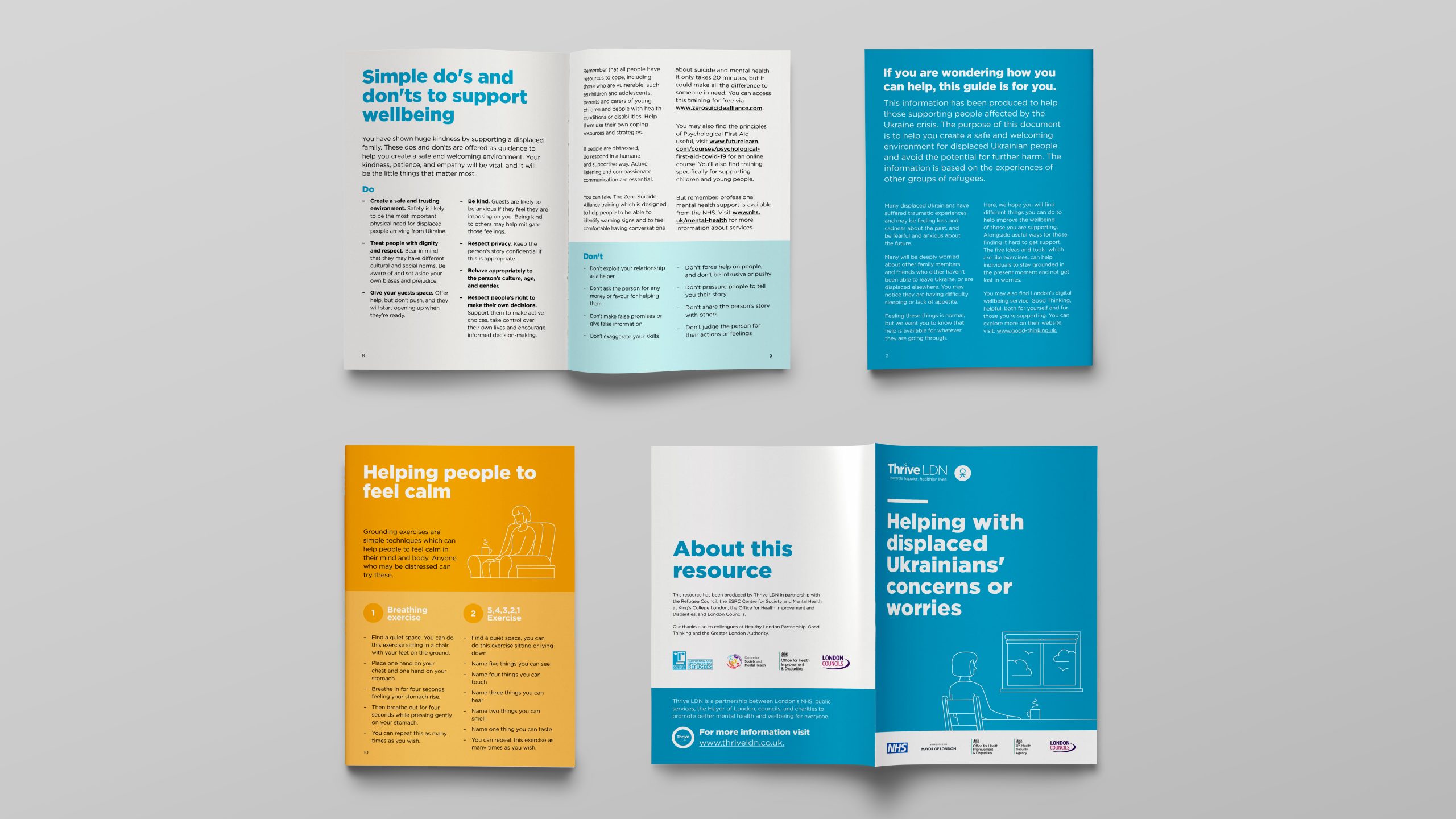
As a result, our ‘Help with your concerns of worries guide’ was utilised by London boroughs and other London partners, as well as being listed across the government’s website and numerous local authorities beyond Greater London.
Overall, 667 people took part in trauma-informed practice in humanitarian crisis training. Of those, 262 completed the foundation level, 187 completed the intermediate level, and 218 completed the advanced level training.
Training feedback:
“I found [the training] really useful’ – professional working with asylum seekers and refugees.”
“Very clear trainer, well thought out and beautiful slides. I have attended several similar trainings on supporting wellbeing and mental health but this articulated information in such a digestible way. Incredibly helpful and I feel more confident in supporting refugees as a result.”
“Very informative around symptoms of trauma and recognising coping rather than focusing on negative actions.”
“The clear information, excellent presentation and very good organisation of the event. This is one of the best trainings I have attended recently. I will be recommending it to my colleagues and some of my friends who are sponsoring refugees.”
Supporting Turkish, Kurdish, and Syrian Londoners’ mental health needs
During 2023, we played a supporting role in the initial response being coordinated by London partners in their response to Turkish and Syrian communities in London in the wake of the devastating earthquakes which hit southern Turkey and north-west Syria in early February 2023.
We rapidly collated sources of support which were available at the time that were helpful for both individuals and those supporting the response, such as training resources and sharing local support group details.
As well as providing a scenario planning briefing on the response to the earthquakes in Turkey and Syria for statutory and system partners, which included some suggested recommendations for next steps and programmes to support the longer-term impact on the communities’ mental health and wellbeing.
There were 1,151 views on the webpage collating resources and the scenario planning briefing was downloaded a total of 476 times.
13. Equity, Diversity and Inclusion
Implementing an Equity, Diversity and Inclusion framework
London is a global city where people from different countries, cultures and classes live together, side- by-side. We are privileged to be part of one of the most diverse, multicultural and energetic cities in the world. Whilst this is one of London’s greatest assets, it is also the reason why a one size fits all approach cannot work for protecting and promoting the mental health and wellbeing of over 9 million people.
Since its inception, all Thrive LDN’s activities have been informed by Equality Impact Assessments (EIA). In previous years, we have utilised the assessment tools of partners. However, for 2022/23 we have gone one stage further and developed an Equity, Diversity and Inclusion (EDI) Framework for Thrive LDN, along with an accompanying Equity Impact Analysis template.
Through the development of an EDI Framework, Thrive LDN and its partners are optimally placed to empower those affected by health inequities to influence change through participation. The framework has been designed from a complex system perspective, as action on equity, equality, diversity and inclusion is a pre-condition, outcome and long-term goal for public mental health in London. The principles are interlinked across Thrive LDN’s Theory of Change.
The EIA supports the requirements of the Equality Act 2010 Public Sector Equality Duty, the Advancing Mental Health Equalities Strategic Approach, and the Patient and Carer Race Equality Framework (PCREF) and supports any aspirations to exceed these.
Since June 2022, a total of 20 EDI Check and Challenge Sessions have taken place across all Thrive LDN’s areas of work. Sessions are chaired by Dr Jacqui Dyer MBE, mental health equalities advisor for NHS England and co-lead of Thrive LDN, with the aim of addressing health inequities concerning a programme, project or activity using an EIA.
The sessions are supporting the delivery of more accessible, inclusive, and responsive activities to Londoners and their communities, including those from racialised and minoritised groups. The EDI process continues to be an iterative learning process for the team, facilitated in a safe space.
The EDI framework and approach has also this year supported the work we do with:
• Supporting Thrive LDN’s partners, such as London’s Integrated Care Systems and local organisations, to understand how they can build equality and equity into their strategic and operational processes and practices.
• Supporting coalition building with community and voluntary organisations to reflects the diversity of London.
• Utilising the above approach to bring equity to organisational processes and practices that seek to improve the mental health and wellbeing of London’s diverse population.
• Supporting organisations to become inclusive employers.
• Enabling partners to informally self-assess their progress on the equality improvement journey and determine where and how they need to improve.
Looking ahead, we will continue to learn, evolve and scale our approach to equality, diversity and inclusion within Thrive LDN. The EDI framework and assessment tool will be an essential part of how we set direction for public mental health and continue to expand capabilities to design, deliver and evaluate what works for Londoners, communities and our complex health social care and political system.
